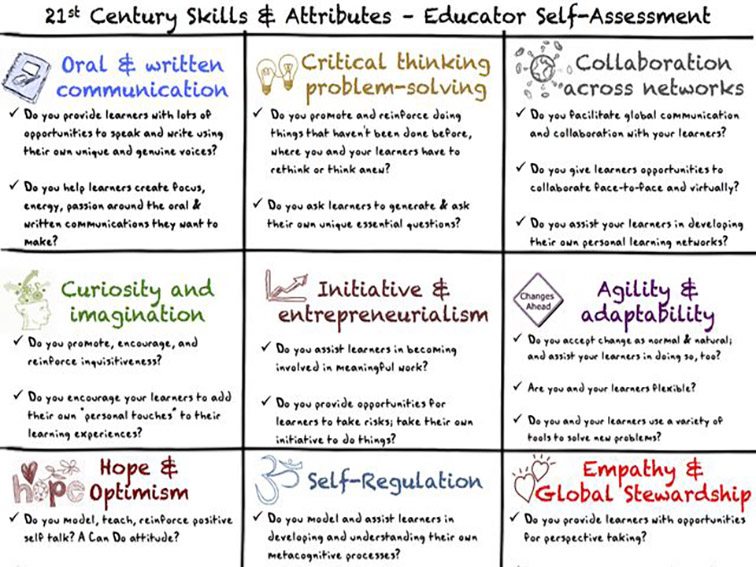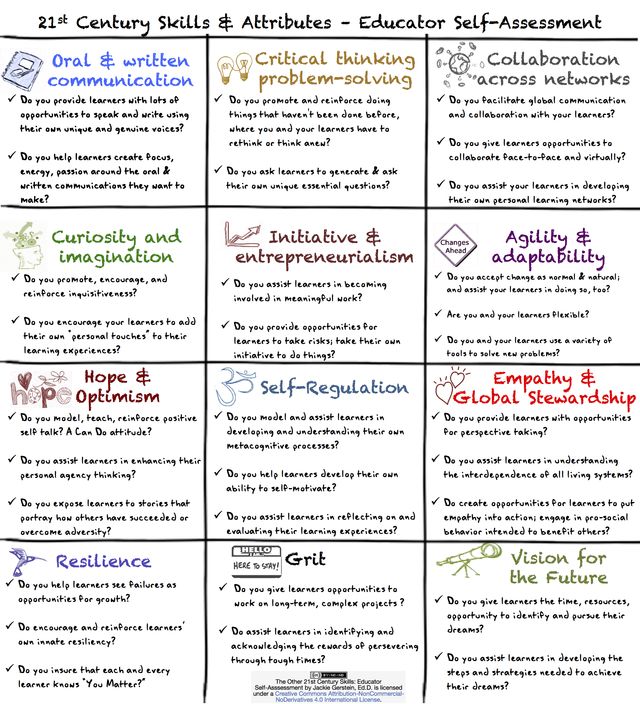
The Wonderful Craft Of Pedagogy: 30 Questions To Evaluate Your Teaching
by TeachThought Staff
Whole Child Learning is a thing; Whole Teaching should be a thing too, no?
Here at TeachThought, Jackie Gerstein’s usergeneratededucation is at the top of our reading list, in large part for her thinking about the human side of formal education. Much of our content–that is, the content here at TeachThought, and that on her site–overlaps because of our shared perspective on teaching and learning: self-directed learning, the role of play in learning, the idea of citizenship, student-centered learning (and student-centered teaching), and more.
(The fact that we have to push ourselves to think of the ‘human side’ could be part of our problem; teaching and learning are among the most human of processes–a natural response to our environment and curiosity.)
We’ve also long been interested in the work of Costa and Kallick with the Habits of Mind (See What Are The Habits Of Mind? and 16 Strategies For Integrating The Habits Of Mind) as wonderful supplements to an academic curriculum. More and more, their richness has us wondering if they’re not more important than the ‘content’ itself.
These ideas have pushed us to consider what it is that students really need to know in a modern world, which we’re going to have to spend some time this year thinking about. And it is in that whole Habits of Mind/new knowledge demands context comes Jackie’s “Twelve 21st Century Skills & Attributes: Educator Self-Assessment.”
Jackie has framed this concept (modern teaching) through nine characteristics, and again through teacher self-assessment questions for each characteristic. The end result is a shift from academia to people who can supplement standards-based teaching and learning, or replace it altogether if we want to get all progressive and avant-garde about it.
You can read more here and follow her on twitter.

The Wonderful Craft Of Pedagogy: 30 Questions To Evaluate Your Teaching
Oral & Written Communication
1. Do you provide learners with opportunities to speak and write using their own unique and genuine voices?
2. Do you help learners create focus, energy, passion around the oral and written communication they want to make?
Critical Thinking & Problem-Solving
3. Do you promote and reinforce doing things that haven’t been done before, where you and your learners have to rethink or think anew?
4. Do you ask learners to generate and ask their own unique essential questions?
Collaboration Across Networks
5. Do you facilitate global communication and collaboration with your learners?
6. Do you give learners opportunities to collaborate face-to-face and virtually?
7. Do you assist your learners in developing their own personal learning networks?
Curiosity & Imagination
8. Do you promote, encourage, and reinforce inquisitiveness?
9. Do you encourage your learners to add their own ‘personal touches’ to their learning experiences?
Initiative & Entrepreneurialism
10. Do you assist in learners becoming involved in meaningful work?
11. Do you provide opportunities for learners to take risks? Take their own initiative to do things?
Agility & Adaptability
12. Do you accept change as normal and natural? And assist your learners in doing the same?
13. Are you and your learners flexible?
14. Do you and your learners use a variety of tools to solve new problems?
Hope & Optimism
15. Do you model, teach, reinforce positive self talk? A ‘Can Do’ attitude?
16. Do you assist learners in enhancing their personal agency thinking?
17. Do you expose learners to stories that portray how others have succeeded or overcome adversity?
Self-Regulation
18. Do you model and assist learners in developing and understanding their own metacognitive processes?
19. Do you help learners develop their own ability to self-motivate?
20. Do you assist learners in reflecting on and evaluating their learning experiences?
Empathy & Global Stewardship
21. Do you provide learners with opportunities for perspective taking?
22. Do you assist all learners in understanding the interdependence of all living things?
23. Do you create opportunities for learners to put empathy into action; engage in pro-social behavior intended to benefit others?
Resilience
24. Do you help learners see failures as opportunities for growth?
25. Do you encourage and reinforce learners’ own intimate resiliency?
26. Do you insure that each and every learner knows “You Matter”?
Grit
27. Do you give learners opportunities to work on long-term, complex projects?
28. Do you assist learners in identifying and acknowledging the rewards of persevering through tough times?
Vision for the Future
29. Do you give learners the time, resources, and opportunity to identify and pursue their dreams?
30. Do you assist learners in developing the steps needed to achieve their dreams?

